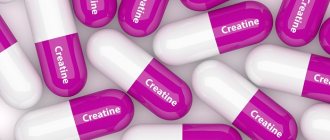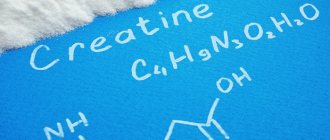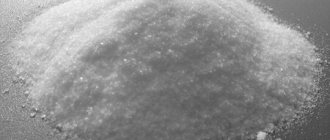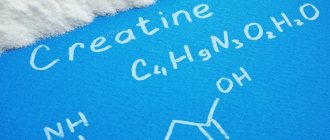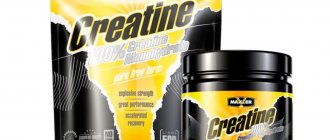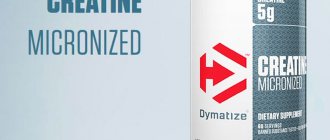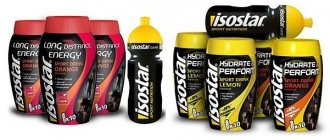Creatine (sometimes called creatine monohydrate) has been called a "phenomenon" in the bodybuilding community and is one of the best-selling muscle-building supplements. Not only athletes, but also adherents of a healthy lifestyle know how to drink creatine monohydrate. To date, more than 500 scientific studies have assessed the effects of supplements on metabolism, muscle growth, exercise performance and many other health indicators.
What are the benefits of taking creatine according to the medical literature? People who take creatine supplements usually do so because they have been shown in studies to improve physical performance, body composition, energy levels and even cognitive function.
Although drinking creatine monohydrate can be an effective way to build muscle mass and increase strength, there are some negative effects that have been associated with this supplement. Is creatine harmful? Depending on who you ask, it may be "surprisingly safe for most people" or potentially cause reactions such as fluid retention and stomach upset. Let's figure it out.
What is creatine monohydrate
The drug is a nutritional supplement that increases the body's endurance during intense physical activity. Testimonials from athletes clearly demonstrate how creatine works. This drug allows you to improve results when playing a variety of sports, especially strength ones.
The important thing is that it has nothing to do with steroids, so it is almost impossible to detect its use. Therefore, it is a legal dietary supplement available commercially in the form of tablets, powder and capsules.
A little biochemistry
To understand how to take creatine powder, you need to understand what processes occur in the body under its influence.
A healthy body, into whose circulatory system creatine enters, supplies this element to muscle tissue. There it is converted to phosphocreatine, which is needed for the synthesis of adenosine triphosphoric acid or ATP. After synthesis, phosphocreatine is converted to creatinine, which is excreted from the body through urination. This is precisely the answer to the question, what is the difference between creatine and creatinine. The first is the main active component, and the second is a residual derivative that does not bring any benefit.
Taking the drug increases the volume of phosphocreatine in the body, starting the process of glycolysis. It empowers athletes by increasing physical potential. In order not to disrupt the normal metabolic process, you need to know how to drink creatine powder correctly. In general, only 2-3 g of the drug per day is enough to achieve the desired effect. As physical activity increases, a larger dose may be required.
Can diabetics, pregnant women and allergy sufferers take creatine?
As mentioned above, creatine is a dietary protein supplement that can be consumed by almost everyone, without age restrictions. Should people with diabetes worry? According to doctors, nutritionists and athletes themselves, creatine is completely harmless for diabetics, provided that it is consumed without glucose. Not long ago, scientists conducted research and proved that creatine stimulates the production of insulin, and therefore can help patients with diabetes. You just need to regularly monitor your blood glucose levels, as it may happen that you have to reduce your insulin dose. But doctors do not recommend that pregnant women take creatine. Although studies in this regard have not been conducted, experts argue their refusal by the fact that the kidneys of pregnant women are already subject to increased stress. Moreover, the expectant mother is prohibited from heavy physical activity, which means the need for creatine is reduced to zero. Allergy sufferers are allowed to take creatine. There is only a small percentage of people who are allergic to creatine. As usual, people with allergies should avoid taking the supplement.
Composition and release form
Creatine monohydrate is an organic compound called a carboxylic acid. Creatine contains amino acids connected by peptide bonds that hold water molecules.
The described food additive is produced in the following forms:
- pills;
- capsules;
- White powder.
Packaged in plastic or metal jars.
When is it best to take before or after training?
Since the body spends a lot of energy and strength during the training process, after training it begins to recover. Metabolism starts, blood flow improves. This is the best time to consume creatine. It is not advisable to use it before the training process, since creatine causes dehydration, and this can harm the body during exercise.
Taking creatine monohydrate powder before exercise as a component of a pre-workout complex is possible as an exception, then it will be effective. There is also no need to take creatine during the training process, because it can be harmful and significantly complicate the performance of athletic exercises.
Effect on the body
On the sports nutrition market now you can count about twenty different types of the drug from different manufacturers. But before you start taking this sports supplement, you should understand in more detail its effects on the body.
Positive
The benefits are as follows:
- rapid gain of muscle mass;
- increase in strength;
- saturating cells with “energy”;
- formation of beautiful muscle relief;
- increased production of testosterone and somatotropin;
- preventing the development of ischemia by supplying tissues with oxygen;
- increased performance.
Negative
It has been proven that taking the supplement is not harmful. However, it may be accompanied by some negative phenomena. Side effects of creatine appear as:
- swelling;
- dehydration;
- disorders of the digestive system;
- seizures
Contraindications
This is a synthetic drug. We have already mentioned what side effects creatine monohydrate has. It also has some contraindications that you should be aware of:
- bronchial asthma;
- pathologies of internal organs;
- pregnancy and breastfeeding period.
Side effects
The only side effect of creatine monohydrate supplementation in pre- and post-surgical patients, untrained individuals and elite athletes was weight gain. However, from time to time, reports appear in periodicals and on the Internet about alleged side effects of using creatine monohydrate supplements. However, they are not supported by any research or experimental data. However, unfortunately, some of these pseudoscientific “concerns” have received some press coverage recently, creating the illusion that there is room for debate on this issue.
Since creatine is an amino acid, it has been suggested that its consumption may negatively affect liver and kidney function. However, no research data were provided to support the occurrence of liver or kidney dysfunction as a result of the use of creatine monohydrate supplements. All these are just words. Not a single study has revealed any side or negative effects from the use of creatine monohydrate by athletes in summer sports (competitions take place outdoors).
It has also been reported several times that creatine monohydrate may cause an increased risk of muscle strains. But no specific data was ever provided on this matter.
Use of the drug
During training, athletes resort to different methods of taking this supplement. The following methods are very popular among athletes.
No download
Take creatine without loading regularly - once a day. The dosage rate is 5-6 g. On rest days, the supplement is taken on an empty stomach. During training, the supplement is taken after exercise. For better absorption, it is better to mix the powder in sweet juice with a gainer or other sports cocktail.
Creatine monohydrate capsules should be taken after taking sports supplements in accordance with the indicated dosage. You can drink the capsules with sweet and sour juice.
With loading
Once loaded, the additive is taken in two stages:
- The first stage is loading. The first week, take 5 g in between meals 4 times a day. On training days, 1 of 4 servings is taken immediately after training.
- The second stage is support. When the loading period is completed, the dose is reduced to 6 g per day. On rest days, you should take the drug in the morning. During training, take after exercise.
It is worth adding that the loading phase is not recommended for women.
Before or after training
When is it better to take creatine - before or after training? According to the rules, you can take it only on training days - before and after training. Many argue that there are no clear benefits to taking this substance on rest days.
The correct method looks like this:
- 1 or 2 hours before training, take 5 g of the supplement and 50-80 g of fast carbohydrates;
- immediately after training, take 5 g with 50 g of fast carbohydrates and 40 g of protein.
What does creatine do before a workout? Of course, there is a result of increasing muscle mass. However, it is not as significant as when taking a nutritional supplement after a workout. For this reason, experts have come to the conclusion that it is better to drink the drug both before and after training.
Duration of admission
Studies have shown that long-term use of this supplement does not have any negative effects on the body. You can take the drug without any worries for several months. The most important thing is that the product is really high quality.
In most cases, the course of treatment is 2 months. In the first week, drink 20 g of the substance - 5 g 4 times a day. All other weeks - take 5 g every day. You will need to take a break of 1 month, then you can repeat the cycle.
Contraindications
Side effects when taking creatine monohydrate are very rare. In addition, it does not have a negative effect and does not disrupt the functions of the body. Despite the safety of the drug, there are a number of contraindications for use.
Creatine is not recommended for use:
- those who have not reached the age of 18;
- women during pregnancy;
- those who have problems with the cardiovascular system;
- people suffering from asthma, diabetes, allergies;
- persons with psychophysical health problems and a tendency to depression;
- people who suffer from epilepsy, arthritis, glaucoma, and prostate disease.
Creatine is prohibited for use by people during the recovery period after surgery, as well as by women while breastfeeding a child.
Don't miss the most popular article in the section: Morning exercises for those over 40, 50. Gymnastics exercises for weight loss, video lessons.
Dosage
To achieve maximum results, you need to understand in what doses it is better to take creatine to gain muscle mass.
Powder
Most experienced athletes prefer to take the powder. How to take creatine monohydrate powder correctly? To do this, you need to take 1 liter of liquid to dilute the powder. Pour 1 heaping teaspoon of the substance into the liquid, which equals 5 g. The powder is thoroughly stirred until completely dissolved and immediately drunk.
In capsules
Taking the drug in capsules has a similar principle to using the powder version. The only difference is that the capsules already contain the required dose of the drug, and they can simply be washed down with juice. Of course, like any nutritional supplement, it is more convenient to take in capsules. You can take them with you to the gym.
What does it contain?
What is the best way to drink creatine monohydrate - in powder or can it be obtained from food? Yes, this substance is found in some foods. Among them:
- tuna;
- herring;
- salmon;
- cod;
- beef;
- pork;
- milk;
- cranberry.
However, the percentage of creatine in these products is very small. For example, to get a daily dose of creatine, you need to drink 50 liters of milk per day. Naturally, this is unrealistic. Therefore, a synthetic drug is an excellent solution to this problem.
When is it better to take creatine - before or after meals? Many experts say that it is better to take this dietary supplement before meals. If taken after a meal, it may cause the food in the stomach to buffer the acidic environment, preventing the conversion of the substance from creatine to creatinine and causing insulin secretion.
It is noteworthy that creatine monohydrate is capable of only minor destruction when exposed to the acidic environment of the stomach. Therefore, in this case, there is not much difference in exactly when to take the nutritional supplement in this form.
Chemical structure
Creatine phosphate is a derivative of amino acids. It is mistakenly called an amino acid, although from a chemical point of view it is a metabolite.
To synthesize creatine, our body uses:
- Methionine;
- Glycine;
- Arginine
That is, technically, it is enough to simply eat protein foods, and the body itself will “make” the required portion of creatine to maintain the contractile activity of muscle fibers.
Interesting fact: foreign athletes massively prefer wild fish and farm beef. The reason is simple - the meat of trained animals contains about 20% more creatine and amino acids. But poultry, conventionally produced veal and farmed fish are “weak” options for replenishing creatine reserves.
Why should we take creatine if we already have to eat large amounts of meat in order to stay strong and beautiful? Creatine phosphate has been repeatedly recognized as a revolutionary supplement in sports nutrition. It's simple. Heat treatment of meat and fish leads to the reverse breakdown of the substance into amino acids. Thus, the body has to synthesize creatine again from amino acids. All this does not allow us to consider meat the optimal product for obtaining creatine phosphate.
In addition, the less heat treatment, the more creatine the meat contains. Few people are ready to eat raw fish and rare steaks every day. And it is not safe for digestion.
Popular myths
To understand what creatine is and why it is needed in bodybuilding, you should know some reliable facts about this dietary supplement:
- The powder is practically insoluble in water for several days and does not dissolve in the stomach.
- Well absorbed by the body. Its main part is absorbed by muscle tissue without changing shape.
- Creatine prevents water from leaving the body.
- Monohydrate is the most beneficial and effective form.
- There is no scientific evidence regarding negative effects on the body.
We should also add that creatine is useful for weight loss. To achieve the desired effect when using creatine for weight loss, you must strictly adhere to the diet and consumption standards. The drug saturates the body with energy, which allows you to train hard, consuming extra calories. Fat is also lost due to increased testosterone levels. However, in some cases, the supplement may slow down the fat burning process.
When drying
Drying is a process during which the fat layer is burned to display the full relief of the muscles. To achieve relief, you need to train hard and spend a lot of energy. And to ensure a long-term training process, taking creatine is perfect.
It must be taken carefully and not overdo it, because creatine causes fluid to accumulate in the muscles, and for a bodybuilder this is an undesirable phenomenon during cutting. However, over time, excess fluid will leave the tissues, but the muscle relief will remain.
Types and differences
Synthesized creatine comes in different types:
- malate;
- citrate;
- monohydrate;
- ethyl ester;
- whey
All this is creatine, which performs the same action. The difference between these types is only in the name. There is no evidence that either type is better than monohydrate. The principle of operation is the same for all. The difference lies only in the speed of dissolution and absorption of the drug. Creatine monohydrate is safe, effective, and helps build lean muscle mass.
How to choose
Before you start taking creatine monohydrate, you need to learn how to choose a quality product. When choosing, you should not pay attention only to well-known brands. It is necessary to pay attention to the size of the particles. The larger they are, the worse they dissolve.
This is also important for those who are looking for an answer to the question of how best to drink creatine monohydrate powder. The fact is that large particles of powder are more difficult for the body to absorb.
Also, the powder must contain nutritional components that facilitate the absorption of the drug by muscle fibers.
Top 10
When choosing a dietary supplement to build muscle mass, how much creatine costs is also important. The rating of creatine with a reasonable price-quality ratio is as follows:
- Dymatize: Creatine Micronized.
- Hardcore Musclebuilding Stack.
- Scitec Nutrition: Creatine 100% Pure.
- Universal Nutrition: Creatine.
- Maxler: 100% Creatine Monohydrate.
- CM2 Alpha.
- SuperPump.
- PureProtein: Creatine.
- BiotechUSA: 100% Creatine Monohydrate.
- NO-XPLODE Creatine.
Reviews
Igor, 31 years old:
“I have been a long-distance runner for many years. Therefore, I decided to try drinking creatine monohydrate and after 2 months I felt changes. Became more energetic, fatigue disappeared. I didn’t find any side effects.”
Dmitry, 25 years old:
“I take creatine. I like the way it affects the muscles - they have become more prominent. This is probably all due to the fact that this nutritional supplement retains water in muscle tissue.”
Vlad, 40 years old:
“I’ve been doing bodybuilding for a long time. I decided to try taking sports nutrition. For a long time I couldn’t decide which type to give preference to. After much thought, I chose creatine. It took me a long time to figure out how much creatine to take. But in the end I found out that the duration of use does not cause any harm. After 6 months of taking it, I noticed clear improvements - the volume of lean muscles increased, and more energy. I didn’t notice any side effects.”
Links[edit | edit code]
- Kamber, M., Koster, M., Krreis, R., Walker, G., Boesch, C., Hoppeler, H. (1999) Creatine supplementation – part 1: Performance, clinical chemistry, and muscle volume. Med.Sci.Sports.Exerc.
- Ganguly, S., Jayappa, S., Dash, AK(2003) Evaluation of stability of creatine in solution prepared from effervescent creatine formulations. AAPS. PharmSci.
- Dr. Roger Harris demonstrated that creatine monohydrate remained completely preserved in aqueous solution for up to 8 hours at room temperature, and that subsequent degradation over the next 3 days was quite low. Newer experiments using NMR (nuclear magnetic resonance spectroscopy) by Dr. Tony Wallner of Barry University have confirmed that creatine monohydrate is quite stable when in aqueous solution. According to Tony Wallner, he and his associates "... discovered that creatine monohydrate is stable in water for a much longer period of time than expected, not in minutes, but in weeks."
- Ganguly, S., Jayappa, S., Dash, AK(2003) Evaluation of stability of creatine in solution prepared from effervescent creatine formulations. AAPS. PharmSci.
- Harris, R. C., Soderlund, K., Hultman, E. (1992) Elevation of creatine in resting and exercised muscle of normal subjects by creatine supplementation. Clin.Sci. 83
- Ganguly, S., Jayappa, S., Dash, AK(2003) Evaluation of stability of creatine in solution prepared from effervescent creatine formulations. AAPS. PharmSci.
- This is explained simply: any form of creatine is a salt, which in the body breaks down into creatine itself and the base. The hydrophilic part is the creatine molecule itself, and it is the same for all forms. Therefore, less water retention only indicates poor absorption of one or another form of creatine.
- Read main article: Creatine Loading
- Williams MH: Facts and fallacies of purported ergogenic amino acid supplements. Clin Sports Med 1999, 18(3):633-49.
- Kreider RB: Effects of creatine supplementation on performance and training adaptations. Mol Cell Biochem 2003, 244(1-2):89-94.
- Volek JS, Duncan ND, Mazzetti SA, Putukian M, Gomez AL, Staron RS, Kraemer WJ: Performance and muscle fiber adaptations to 12 weeks of creatine supplementation and heavy resistance training. Medicine & Science in Sports & Exercise 1999., 31(5).
- Willoughby DS, Rosene J: Effects of oral creatine and resistance training on myosin heavy chain expression. Med Sci Sports Exerc 2001, 33(10):1674-81.
- Willoughby DS, Rosene JM: Effects of oral creatine and resistance training on myogenic factor regulatory expression. Med Sci Sports Exerc 2003, 35(6):923-9.
- Olsen S, Aagaard P, Kadi F, Tufekovic G, Verney J, Olesen JL, Suetta C, Kjaer M: Creatine supplementation augments the increase in satellite cell and myonuclei number in human skeletal muscle induced by strength training. J Physiol 2006, 573(Pt 2):525-34.
- Williams MH, Kreider R, Branch JD: Creatine: The power supplement. Champaign, IL: Human Kinetics Publishers; 1999.
- Kreider R, Melton C, Hunt J, Rasmussen C, Ransom J, Stroud T, Cantler E, Milnor P: Creatine does not increase the incidence of cramping or injury during pre-season college football training I. Med Sci Sports Exerc 1999, 31( 5):S355.
- Kreider RB, Melton C, Rasmussen CJ, Greenwood M, Lancaster S, Cantler EC, Milnor P, Almada AL: Long-term creatine supplementation does not significantly affect clinical markers of health in athletes. Mol Cell Biochem 2003, 244(1-2):95-104.
- Graham AS, Hatton RC: Creatine: a review of efficacy and safety. J Am Pharm Assoc (Wash) 1999, 39(6):803-10.
- Juhn MS, Tarnopolsky M: Potential side effects of oral creatine supplementation: a critical review. Clin J Sport Med 1998, 8(4):298-304.
- Taes YE, Delanghe JR, Wuyts B, Voorde J, Lameire NH: Creatine supplementation does not affect kidney function in an animal model with pre-existing renal failure. Nephrol Dial Transplant 2003, 18(2):258-64.
- Schilling BK, Stone MH, Utter A, Kearney JT, Johnson M, Coglianese R, Smith L, O'Bryant HS, Fry AC, Starks M, Keith R, Stone ME: Creatine supplementation and health variables: a retrospective study. Med Sci Sports Exerc 2001, 33(2):183-8.
- Greenwood M, Kreider R, Greenwood L, Byars A: Creatine supplementation does not increase the incidence of injury or cramping in college baseball players. Journal of Exercise Physiology online 2003, 6(4):16-22.
- Greenwood M, Kreider R, Greenwood L, Earnest C, Farris J, Brown L: Effects of creatine supplementation on the incidence of cramping/injury during eighteen weeks of collegiate baseball training/competition. Med Sci Sport Exerc 2002., 34(S146).
- Watsford ML, Murphy AJ, Spinks WL, Walshe AD: Creatine supplementation and its effect on musculotendinous stiffness and performance. J Strength Cond Res 2003, 17(1):26-33.
- Dalbo VJ, Roberts MD, Stout JR, Kerksick CM: Putting to rest the myth of creatine supplementation leading to muscle cramps and dehydration. Br J Sports Med 2008, 42(7):567-73.
